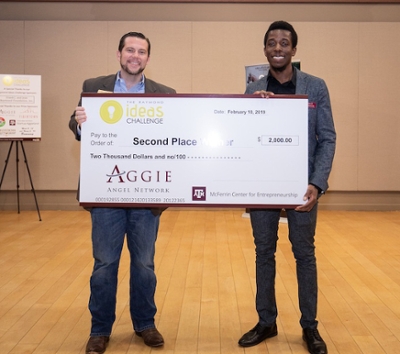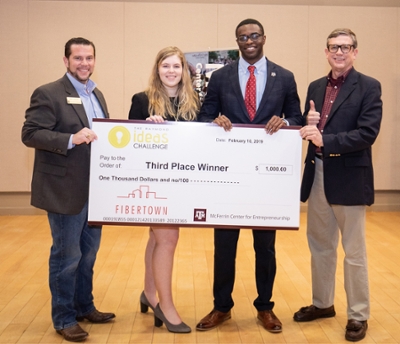
Two teams of from the Texas A&M University College of Engineering placed in the top three of the 2019 Raymond Ideas Challenge, a competition that encourages undergraduate and graduate students to dream up the next great product or service and enter their big idea in this campus-wide competition.
Offered through the McFerrin Center for Entrepreneurship in the Mays Business School, the program offers a number of unique features and benefits, including:
- Real-world experience: Students receive valuable experience developing business concepts, writing skills and presentation abilities.
- Networking opportunities: Students have the opportunity to network with the judges and gain invaluable contacts.

Tokunbo “TJ” Falohun, biomedical engineering graduation student, took second place with his pitch for BioCompass, an idea focused on a user-friendly approach to diabetes management using biosensors and connected electronics.
“The idea was inspired by the work done in the Biosensing Systems and Materials Lab where we develop implantable hydrogel biosensors for chronic disease management,” Falohun said. “The idea was also shaped by my experience in the NSF (National Science Foundation) I-Corps Site Fellows program, which I participated in last semester.”
Falohun said entrepreneurship excites him and saw the challenge as a perfect chance to test his ability to present an idea, rooted in biomedical engineering, to an external audience.
“In my view, the prospect of turning an idea that previously didn’t exist into a product or service that can improve the lives of people is a challenge worth undertaking,” Falohun said.
Falohun said his experience in the challenge would not have been possible without the supportive environment provided by his supervisor Dr. Mike McShane, his research group and the Department of Biomedical Engineering. He said the challenge reminded him of the importance of extending past the boundaries of his field.
“By doing so, we learn more about our ourselves — our interests, strengths and weaknesses,”. Falohun said. “Stepping out of our comfort zone is also a catalyst to new ideas and a means to form new relationships.”

Third place went to Biocompatible Projectile, a mixed team of engineering students that aimed to bridge the gap between lethal and nonlethal weapons by providing neutralization power of a lethal round while preserving life through hemostatic, or blood clotting, material.
“It’s been an amazing experience working with other engineering majors,” said Elise Hackney, mechanical engineering junior. “One branch of engineering isn’t enough when working to find a solution to a major problem. You need people who are versed in a variety of subject areas, which often brings different perspectives and approaches that lead groups toward a more effective solution.”
Other members of Biocompatible Projectile were Ben Omonira, chemical engineering junior, and Seth Reine, biomedical engineering junior.
Omonira said the challenge provided the team with insight and allowed them to grow their network of technical and business expertise. Members of the business and academic worlds judged each submission and the top 40 were named finalists. Finalists presented their concept to judges from the business community who challenged them with questions.
“I was blown away by the judges’ intentional feedback,” Omonira said. “The single factor that made this experience meaningful was the fact that the judges wanted to become mentors and maintain a relationship that goes beyond the Raymond Ideas Challenge.”
For Omonira, he anticipated a high-caliber group of innovative students would participate, and the tough competition would make the reward much more meaningful.
“I want students to know that an idea is worth fighting for here at Texas A&M, and through the Raymond Ideas Challenge experience we had key moments to recognize a need to pivot or persist and forge a better vision,” Omonira said.